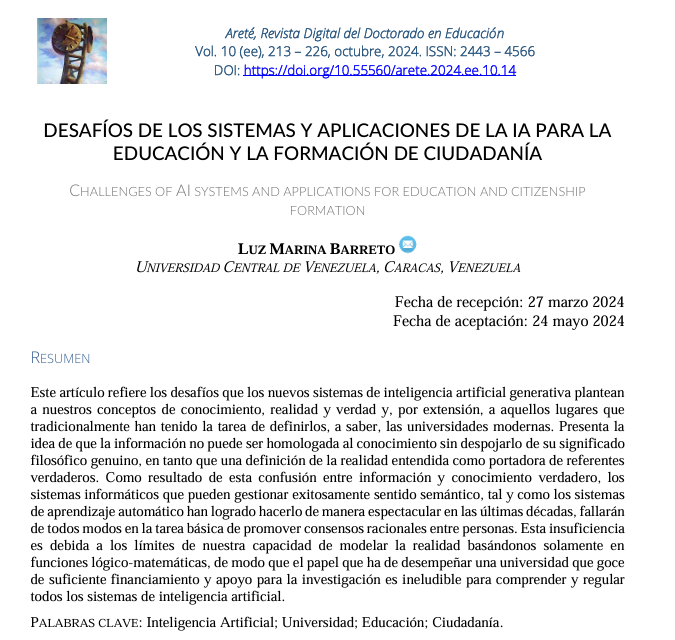Challenges of AI systems and applications for education and citizenship formation
Keywords:
Artificial Intelligence, University, Education, CitizenshipAbstract
This paper addresses the challenges posed to our concepts of knowledge, reality and truth (and by extension to the places traditionally endowed with the task of defining them, i.e., modern universities) by the new systems of generative artificial intelligence. It conveys the idea that information cannot be understood as knowledge without emptying the latter from its genuine philosophical meaning as a conceptualization of reality that carries true meaning. As a result of the confusion between information and true knowledge, systems that can successfully manage semantic meaning, as all digital and machine learning systems have spectacularly learned to do in the last decades, will nevertheless fail in their capacity to bring about rational consensuses among persons. This happens because our capacity to model reality solely with logic and mathematical functions is limited and therefore my paper stresses the role a well-funded and unabashed university has to play in understanding and regulating all systems of artificial intelligence.
Downloads
References
Anderson, P. (1972). More is different. Revista Science, Vol. 177. 4047.
Barabási, A. L. (2018). The Formula. Hachette Book Group.
Barreto, L.M. (2018). Estudio de dos paradigmas de modelado de tópicos aplicados sobre un conjunto de datos tomados de una red social. Tesis de Maestría en Ciencias de la Computación. Universidad Central de Venezuela. http://saber.ucv.ve/handle/10872/20186
Barreto, L.M. (2022). Rational consensus and deliberative democracy in complex societies dominated by online social media interactions. Revista Episteme NS, 42. http://saber.ucv.ve/ojs/index.php/rev_ens/article/view/26591
Barreto, L.M. (2023 a). Una escuela alemana. Los orígenes de la Escuela de Filosofía de la UCV. Revista Trópico Absoluto. Revista de Crítica Pensamiento e Ideas. https://n9.cl/4whs1
Barreto, L.M. (2023b). Sobre la tal vez imposible universalidad del conocimiento. Revista Trópico Absoluto. Revista de Crítica Pensamiento e Ideas. https://n9.cl/4jlr8
Barreto, L.M. y Núñez, H. (2020). Una exploración de la semántica del concepto de ‘Derechos’ en Twitter. Revista Apuntes Filosóficos, 30(48). http://saber.ucv.ve/ojs/index.php/rev_af/article/view/23753/144814489981
Caldarelli, G. (2007). Scale-free Networks. Complex Webs in Nature and Technology. Oxford University Press.
Castellano, F. y Loreto (2009). Statistical physics of social dynamics. Rev. Mod. Phys. The Americal Physical Society, No. 81.
D’Souza, R.M. (2015). The Mathematics of Influence and Opinion Analysis. You Tube, 2015, Canal @UCDavisSocialSciences.
Einstein, A. (1905). Über die von der molekularkinetischen theorie der wärme geforderte bewegung von in ruhenden flüssigkeiten suspendierten teilchen. Annalen Der Physik, 322:8, 549-560. https://onlinelibrary.wiley.com/doi/10.1002/andp.19053220806
Gilson, É. (2004, orig. 1948). La unidad de la experiencia filosófica. Rialp.
Gleick, J. (2011). The information: a history, a theory, a flood. Pantheon Books, 2011.
Granovetter, M.S. (1973). The Strength of Weak Ties. American Journal of Sociology, 78:6, 1360-1380.
Heidegger, M. (orig. 1927). Ser y tiempo. Fondo de Cultura Económica.
Kissinger, H., Schmidt E. y Huttenlocher, D. (2022). The Age of AI. John Murray Publishers.
Lonergan, B. (2005). Insight, a study on human understanding. University of Toronto Press.
Lucas, J. R. (1961). Minds, Machines and Gödel. Philosophy, XXXVI.
Mobilia, M. (2003). Does a Single Zealot Affect an Infinite Group of Voters? Phys. Rev. Lett. 91, 028701. https://doi.org/10.1103/PhysRevLett.91.028701
Perra, N., Rocha, L.E.C. (2019). Modelling opinion dynamics in the age of algorithmic personalisation. Scientific Reports 9, 7261 https://doi.org/10.1038/s41598-019-43830-2
Popper, K., (1963). Conjeturas y refutaciones. El desarrollo del conocimiento científico. Paidós Básica.
Shannon, C. (1948). A Mathematical Theory of Communication. The Bell System Technical Journal, 27(3).
Spitzer S.J., Robert J. (2015). The Soul’s Upward Yearning, Ignatius Press. San Francisco.
Strawson, P.F. (1992). Analysis and Metaphysics. Oxford University Press.
Wittgenstein, Ludwig, (2021, orig. 1939). Investigaciones filosóficas. Editorial Trotta.
Wolfram, S. (2023). How to Think Computationally About AI, the Universe and Everything. TED, Youtube: https://www.youtube.com/watch?v=fLMZAHyrpyo&t=423s.

Published
How to Cite
Issue
Section
License
Copyright (c) 2024 Luz Marina Barreto

This work is licensed under a Creative Commons Attribution-NonCommercial-ShareAlike 4.0 International License.
This journal provides free, immediate access to its content under the principle of making research freely available to the public, which fosters a greater exchange of global knowledge.
Authors who publish in Areté, Revista Digital del Doctorado en Educación, agree to the following terms:
- Authors retain copyright and grant the journal the right to be the first publication of the work, as well as licensed under a Creative Commons Attribution License that allows others to share the work with an acknowledgement of authorship of the work and initial publication in this journal.
- Authors may separately establish additional agreements for the non-exclusive distribution of the version of the work published in the journal (for example, placing it in an institutional repository or publishing it in a book), with an acknowledgement of its initial publication in this journal and not to be used for commercial purposes.
- The contents and images included in the articles are the responsibility of the author(s). Areté, Revista Digital del Doctorado en Educación, is not responsible for the information included in them.
- Authors agree with the license of use used by the journal, with the self-archiving conditions and with the open access policy.
- Authors are allowed to disseminate electronically (e.g., in institutional repositories or on their own website) the published version of their work, as it favors its earlier circulation and dissemination and thus a possible increase in its citation and reach among the academic community.
- In case of reuse of published works, the existence and specifications of the license of use must be mentioned, as well as the authorship and original source of publication.






